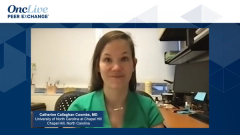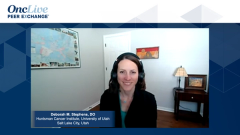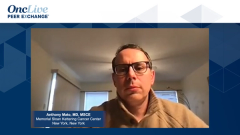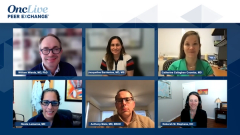
Ibrutinib Therapy for CLL: Long-Term Data
Reactions to longer-term follow-up data presented in 2021 on the use of ibrutinib as frontline treatment for patients with chronic lymphocytic leukemia.
Episodes in this series

William Wierda, MD, PhD: Let’s start with the updates that we’ve had available over the last year. Jackie, we can start with you and if you could sort of give us your thoughts and comments around recent updates over the last data about ibrutinib [Imbruvica®]-based therapy.
Jacqueline Barrientos, MD, MS: At ASCO 2021 [American Society of Clinical Oncology annual meeting 2021], we had the 7-year follow-up for the RESONATE-2 study of first-line ibrutinib treatment for patients with chronic lymphocytic leukemia [CLL]. As you may remember, this was a registrational phase 3 trial that led to the approval for the drug for frontline treatment of patients with treatment-naive CLL. And it randomized patients to receive either ibrutinib or chlorambucil as monotherapy. Patients had to be over age 65 and with longer follow-up at 6.5 years, the PFS [progression-free survival] was 61% in patients with ibrutinib, whereas patients treated with chlorambucil was only 9%. It was interesting to see that the response rate was very high and reported as 92% for ibrutinib-treated patients with a number that we have never seen before for complete remission, which ended up being 34% at this follow-up. Meaning the longer that you’re on the drug, the higher rates of complete remissions that you can achieve. The ongoing rates of grade 3, or adverse events of interest, remained low, and these were hypertension and atrial fibrillation with no grade 3 or higher major hemorrhage.
The other study that was important to discuss was the longer follow-up for patients treated in the ALLIANCE trial; the outcomes were given and reported by Dr Jennifer Woyach [Jennifer A. Woyach, MD] at ASH 2021 [American Society of Hematology annual meeting 2021]. She discussed longer follow-up of, as you remember, the ALLIANCE trial that led to the finding of ibrutinib-treated patients doing better when compared against BR, or bendamustine [Treanda®] and rituximab [Rituxan®]. The trial initially was presented in the first interim analysis, and it showed superiority in terms of PFS for patients randomized to any of the ibrutinib-treated arms. And what we see here with the longer follow-up is that the all-grade rate events of atrial fibrillation is 19% and all-grade rate events of hypertension in patients with ibrutinib was 73%.
Now, something that I don’t think anyone was surprised about was the fact that patients that had high-risk disease did have a much better benefit compared to the patients that were randomized to BR [bendamustine, rituximab]. Ibrutinib continues to be the best drug for patients with high-risk disease, including patients with unmutated IgHV [immunoglobulin heavy chain variable] gene or deletion (17p). The median PFS for patients treated with BR was 44 months, and patients treated with ibrutinib or ibrutinib in combination with rituximab, the median PFS has not been reached. The other thing we saw on this abstract is that essentially the addition of rituximab does not correlate with an improved PFS. And, as such at this moment, we still believe that ibrutinib monotherapy might be a good treatment.
William Wierda, MD, PhD: Very active treatment, highly effective drug, a drug that gets a response in most all the patients but they’re not deep remissions. As we know, patients remain on treatment and are on treatment for an extended period. Let’s about adverse effects and toxicities. What are the adverse effects and toxicities that you think about and talk to your patients about prior to starting them on ibrutinib-based therapy, Nicole?
Nicole Lamanna, MD: When we talk about the class in general, we obviously think about cardiovascular toxicities, such as atrial fibrillation or atrial flutter. You can also see ventricular arrhythmias, hypertension, bleeding issues, mostly minor bruising and petechiae. Certainly, there could be serious bleeding but that’s relatively rare. Arthralgias and fatigue, those tend to be, sometimes some GI [gastrointestinal] issues as well, but those are the more serious issues that we consider when we talk about initiating BTK [Bruton tyrosine kinase] inhibitors in general. And certainly, when we look at deciding between treatment options for patients depending upon if they have severe cardiac risk factors, are on anticoagulation or antiplatelet agents, those are things we’ll take into consideration when starting, let’s say, ibrutinib. Of course, we have the second-generation. We could talk about the other BTK inhibitors versus alternative therapy as well.
William Wierda, MD, PhD: Are there any patients you would not give a BTK inhibitor to or ibrutinib to as a first-line therapy?
Nicole Lamanna, MD: Now that we have multiple options, I mean back in the day when ibrutinib was the first to market, clearly for our multiple relapsed patients regardless of what their comorbidities were, certainly if they’re CLL, if they were going to succumb to their CLL, we were putting them on ibrutinib and managing their comorbidities along with the drug. Now that we have multiple options, of course a consideration is if you’re concerned about if there are poorly controlled hypertension, severe cardiovascular disease, not very well controlled, on anticoagulation, you know if you think that a BTK inhibitor or ibrutinib might be a concern to give them potential toxicities, you might choose an alternative therapy like venetoclax [Venclexta®]. But certainly, you weigh the risk-benefit ratio and certainly if there’s a concern, you might want to choose a second generation, such as acalabrutinib [Calquence®], and we can talk more about that. Certainly, we have more options, and we can have those discussions with our patients accordingly.
Transcript edited for clarity.






































